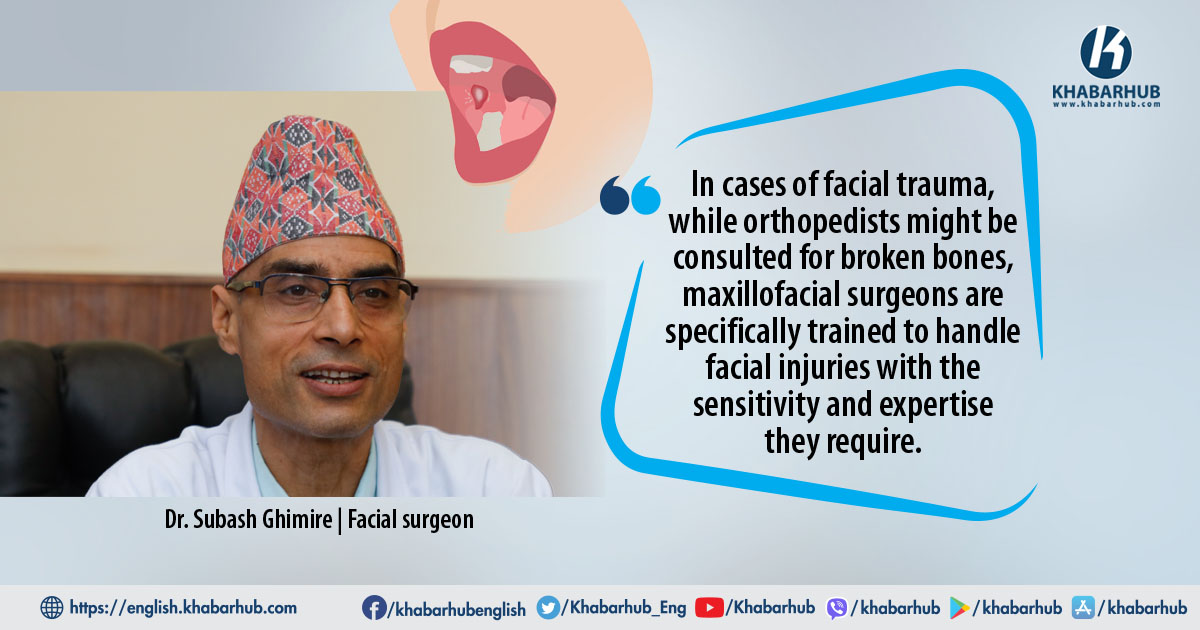KATHMANDU: The mouth is a crucial part of our body, involved in everything from eating to speaking and enhancing our appearance.
Given its constant activity, maintaining oral health is essential.
Doctors emphasize that the mouth’s health is vital, and issues affecting the face and mouth—whether due to accidents or congenital conditions—are often addressed through maxillofacial surgery.
However, many people are still unaware of what this surgery entails.
To shed light on this topic, we spoke with Surgeon Dr. Subash Ghimire about maxillofacial surgery and its significance.
What kind of treatment method is maxillofacial surgery?
Maxillofacial surgery addresses issues related to the outer parts of the mouth and face.
This includes everything except the pupil of the eye, the external area of the nostrils, the outer part of the ear, and the neck.
What kind of facial problems require this surgery?
Maxillofacial surgery is categorized into three main types:
Congenital Issues: This includes conditions present at birth such as cleft lip, cleft palate, misaligned eyeballs, absent nostrils, damaged cheekbones, and abnormal mouth structures.
Postnatal Problems: These are issues arising from forceps delivery or injuries sustained during play.
Disease-Related Problems: Conditions such as mouth sores, water blisters, cancer, and other oral health issues that necessitate surgical intervention.
Is this technology new in Nepal?
Maxillofacial surgery has been practiced in Nepal for about 30 to 40 years, but initially, it was performed by general or ENT surgeons.
Dedicated maxillofacial surgery started in 2004.
However, many people are still unaware of this specialized field. In cases of facial trauma, while orthopedists might be consulted for broken bones, maxillofacial surgeons are specifically trained to handle facial injuries with the sensitivity and expertise they require.
How often do patients need oral surgery?
The frequency of oral surgeries is increasing. Modern lifestyles and dietary habits contribute significantly to oral health problems.
The rise in smoking, alcohol consumption, and the use of products like gutkha and pan masala, combined with sedentary lifestyles, is leading to a higher number of maxillofacial cases.
Additionally, accidents and unhealthy eating habits have increased the incidence of oral cancer and facial injuries.
What is the level of awareness among the general public about oral health?
Awareness among the general public is improving, partly due to the influence of Nepalis who travel abroad, where oral health standards are higher.
However, the government has not significantly prioritized this issue.
While private hospitals are making strides in spreading awareness, government efforts are lacking.
The focus tends to be on treating diseases rather than prevention. If the government invested in oral health education, many chronic conditions could be avoided.
The funds currently allocated for treatment could be better spent on preventive measures, which would likely reduce the prevalence of various health issues.
How should one pay attention to for oral health?
To maintain optimal oral health, focus on the following four key areas:
Diet: The mouth is involved in eating both healthy and unhealthy foods. If you don’t pay attention to your diet, no amount of brushing will keep your mouth clean.
Consuming nutritious food benefits both your mouth and body.
Your body has natural defenses, but if you neglect your diet, you may need medication when your body’s immunity fails.
Medicines can only suppress diseases temporarily and cannot cure them.
Many diseases, including oral cancers and diabetes, are related to poor dietary habits. Avoid junk food, tobacco products, and alcohol, as these can harm your body.
Psychological well-being: What you say and how you say it impacts your mental health.
Speaking kindly can resolve many issues and reduce anxiety and stress. Good mental health is crucial for maintaining oral health, as stress and mental strain can negatively affect your mouth.
Therefore, maintaining psychological fitness is essential for overall oral health.
Physical exercise: Regular physical exercise and yoga are important for maintaining both oral and overall health.
Exercise supports your body’s systems and contributes to better oral health by improving circulation and reducing stress.
Proper brushing technique: Brush your teeth at least twice a day, in the morning and before bed.
Ensure you clean all parts of your teeth: the outer surfaces, the biting surfaces, and the tongue.
Don’t forget to brush between your teeth to reach all five areas. Regular dental check-ups should be conducted every three to six months to ensure comprehensive oral care.
By incorporating these four practices into your daily routine, you can improve your oral health and overall well-being.









Comment